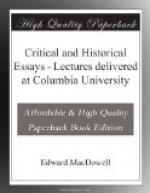After the death of Konrad IV, the last Swabian emperor of the House of Hohenstaufen, minnesinging in Germany declined, and was succeeded by the movement represented by the meister or mastersingers. During the fourteenth and fifteenth centuries, when Germany was broken up into countless small duchies and kingdoms, many of the German nobles became mere robbers and took part in the innumerable little wars which kept the nation in a state of ferment. Thus they had neither time nor inclination to occupy themselves with such pursuits as poetry or music. In the meanwhile, however, the incessant warfare and brigandage that prevailed in the country tended to drive the population to the cities for protection. The latter grew in size, and little by little the tradespeople began to take up the arts of poetry and music which had been discarded by the nobles.
Following their custom in respect to their trades, they formed the art companies into guilds, the rules for admittance to which were very strict. The rank of each member was determined by his skill in applying the rules of the “Tabulatur,” as it was called. There were five grades of membership: the lowest was that of mere admittance to the guild; the next carried with it the title of scholar; the third the friend of the school; after that came the singer, the poet; and last of all the mastersinger, to attain which distinction the aspirant must have invented a new style of melody or rhyme. The details of the contest we all know from Wagner’s comedy; in a number of cases Wagner even made use of the sentences and words found in the rules of the mastersingers. Although the mastersingers retained their guild privileges in different parts of Germany almost up to the middle of the present century, the movement was strongest in Bavaria, with Nuremberg as its centre.
Thus we see that the mastersingers and the minnesingers were two very different classes of men. The mastersingers are mainly valuable for having given Wagner a pretext for his wonderful music. Hans Sachs was perhaps the only one of the mastersingers whose melodies show anything but the flattest mediocrity. The minnesingers and their immediate predecessors and successors, on the other hand, furnished thought for a great part of our modern art. To put it in a broad manner, it may be said that much of our modern poetry owes more than is generally conceded to the German mediaeval romance as represented in the works of Wolfram von Eschenbach, Gottfried of Strasburg, and the unknown compilers of the “Nibelungenlied” and “Gutrune.” Music owes more to the troubadours, for, from what we know of the melodies of the minnesingers, they cannot compare in expressiveness with those of their French confreres.
In closing this consideration of the minnesingers, I will quote some of their verses and melodies, giving short accounts of the authors.




